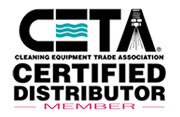When you work in a dirty industry, you need the perfect piece of equipment to clean up the mess left behind. If you work in the fishing or marine industry, you need a high-powered machine to keep your docks and boat clean. If you work in construction, you need to constantly clean dirt and grime from walkways & equipment. And if you work in an industrial warehouse, you need durable machinery that can scrub high-traffic areas. Facilities need to clean walkways, buildings, graffiti or even roofs.
In short, you need a pressure washer.
But what type of pressure washer will work best for your unique situation? Some pressure washers run on gas and some on electricity, and different types of pressure washers have different PSIs, so how do you know which has the power to take on your trickiest jobs?
Keep reading for a brief guide on how to choose the right industrial pressure washer for your business. Some spray cold water and some have heaters to give you 200° hot water. It all boils down to the power available and portability necessary to do the job.
Choose Between Gas and Electric
Both gas-powered and electric-powered pressure washers can be effective in the workplace. There are a few things to take into consideration to help make the best decision for you.
Usually electric units are used where the machine is used in one place. Electric units are quieter, have less maintenance, and are best used in stationary applications such as food production, car dealers, or where equipment needing cleaning is brought to a central location with a dedicated circuit to run the pressure washer.
A small pressure washer (2 GPM @ 1000, 15 Amps or 2 GPM @ 1500 PSI, 20 Amps) can run on 120 Volt where a larger pressure washer (2000 PSI and above) requires 230 Volt.
When more power is required and you don’t have a 230 volt outlet available, then a gas engine machine can give you the higher pressure required without being tied to an outlet, thereby giving you more portability.
If you use an electric washer, you’ll obviously need to stay near an outlet to use the washer. Gas washers give you more flexibility-you can move them wherever you need to.
Find the Right PSI (Pounds per Square Inch) and GPM (Gallons per Minute)
What’s better, volume or pressure? The answer is both! PSI and GPM are both equally important when choosing a pressure washer. You must have the correct combination of PSI and GPM to have the most ideal pressure washing system for your needs. Pressure alone with love volume only tears things up and has no coverage or mass to move anything. You need volume to backup the pressure or you end up just making stripes. Pressure gives you penetration and volume is what moves dirt and gives you speed. So for large surface areas, volume is actually the key. You need pressure strong enough to get through the surface dirt and enough volume to cover a respectable area and keep it moving.
Consider your needs as you evaluate different washers’ PSIs:
- 2 GPM @ 1500 PSI – Great for auto detailing
- 3-4 GPM @ 2000 PSI -. Light- to medium-duty washers great for small equipment cleaning.
- 4-5 GPM @ 3500-4000 PSI – Great for concrete & masonry, and heavy equipment cleaning.
Know How to Use a Pressure Washer
Once you’ve chosen your pressure washer, you need to handle it correctly to ensure it lasts and that your employees stay safe around it.
Start with the right safety gear. While you clean, wear protective eye gear. If you have a louder model (especially a gas model), protect your ears just as you would if you used a lawnmower or string trimmer. You should also use protective clothing such as Helly Hansen rainwear and gloves. All of this safety gear can be found at Ben’s Cleaner Sales.
You should always start to spray from a normal cleaning distance of 6” to 12”. Always point the pressure washer away from other people and yourself. The strong stream of water can cause serious injuries, including laceration. To help prevent cutting yourself with the water stream by making it harder to turn it on yourself, the UL requirement is a 29.5” wand for 3200 psi or less & a 48” wand for over 3200 psi.
You might want to test the pressure washer on a surface other than the one you plan to clean first-that way, you’ll get a better idea of how much power your pressure washer has so you don’t damage the more important surface. Try a stretch of concrete or other durable material.
Turn to Us for the Right Pressure Washer
No matter what industry you’re involved in, you can benefit from a high-quality pressure washer. Use the tips above to sort through your options and narrow in on the right pressure washer for your company’s unique needs.
If you’re in the market for a pressure washer in Washington, turn to Ben’s Cleaner Sales. We have pressure washers and other types of cleaning equipment for businesses and home owners, along with all the products to protect yourself while using one. If you’re still not sure what type of pressure washer best fits your needs after reading this blog, ask us-we’ll be happy to give you a recommendation.

